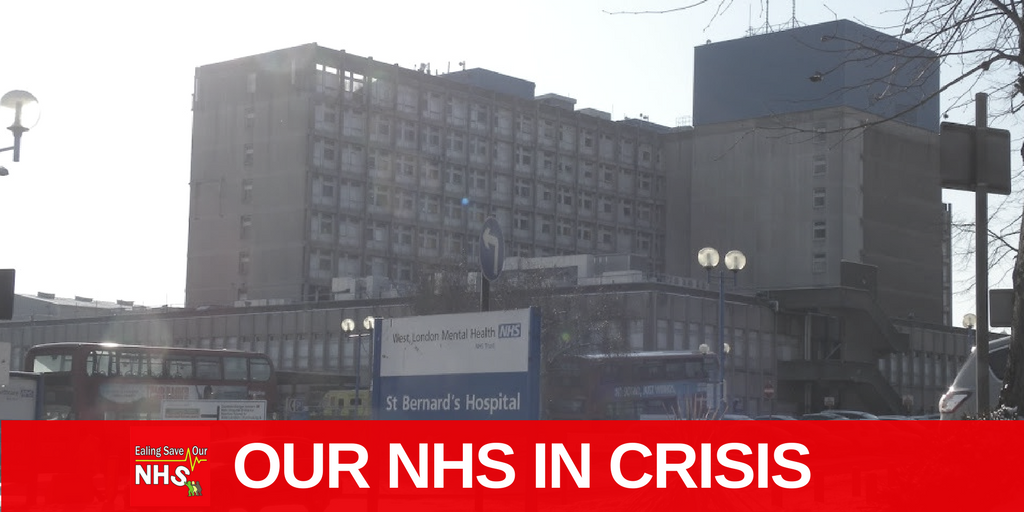Chance to Publicly Scrutinise NHS North West London Healthcare Purchasers is Wasted.
One of the few ‘in public’ NHS NW London-wide meetings at which elected Members (i.e. Local Councillors) examine NHS healthcare performance and plans took place on Tuesday 5 December 2017. It was a meeting of the NHS North West London Joint Health Overview and Scrutiny Committee (JHOSC). This is a fairly rare event taking place perhaps only twice each year.
16 Councillors from the eight NHS North West London (NWL) Local Authorities were invited to attend this JHOSC meeting but only four of them turned up. None from Ealing and none from Brent for example. More members of the public attended than elected Councillors in NWL. The strange location of the meeting did not help. It took place in Twickenham, Richmond at 9:30am. Richmond isn’t an NHS NWL borough, but some of its Councillors did turn up.
The NWL Collaborations of CCGs bombarded the attendees with 90 pages of seven papers. The two Accountable Officers for NHS NWL CCGs Ms Clare Parker and Mr Rob Larkman were in attendance. Juliet Brown also attended. She is Local Services Transformation Director. Clinical support was provided by Dr Le Brooy, the new NHS NWL ‘Shaping a Healthier Future’ (SaHF) Medical Director. (Her predecessor Dr Mark Spencer has moved out of SaHF into healthcare management consultancy).
Many of the Councillors’ questions were ‘thin’ on content. This was possibly because they had not had time to study the 90 pages and/or they had insufficiently followed and researched the five year SaHF cost cutting /service transformation to-ings and fro-ings. One Councillor never spoke at all during the 2.5 hour meeting.
Getting Elderly Patients Out of Hospital
Dr Le Brooy, a senior geriatrician, led the NHS attack here under the banner of ‘Front End Frailty Services’. The plan is to admit as few as possible elderly people into hospital. Evidence from Sheffield, Leicester and Poole was quoted. The whole approach can clearly only work if significantly expanded home-based and community-based healthcare and social care support services are in place.
The nirvana quoted was multi-disciplinary teams working together to assess old peoples’ needs and to offer an alternative to hospital admission. These team members include mental health practitioners, geriatricians, pharmacists, dieticians, speech and language specialists, frailty nurses, social care decision makers and therapists. One does wonder whether this is happening now? Will it happen consistently in the future given the continuing shortage of staff across the board? Is this just pie in the sky?
Dr Le Brooy admitted that there was a shortage of geriatricians . The Chair expressed concern of anecdotes about elderly people being discharged from hospital over night and delivered to empty homes.
Accountable Care Organisations (ACOs)
Mr Larkman and Ms Parker delivered inadequate presentations on ACOs. They ran through some of the usual ACO mantras of fragmentation, misaligned incentives, access, population needs and joined up health and social care services. They mysteriously failed to mention that ACOs will be fixed price, long term contract beasts which will force through massive cost cutting.
They provided sketchy details about the Hillingdon elderly peoples’ Accountable Care Partnership (ACP) which is apparently the most advanced regional ACO. This will apparently feature the Hillingdon CCG and the London Borough of Hillingdon (LBH) working together. Rumour has it that LBH is not co-operating with the CCG on the NHS NWL Sustainability and Transformation Plan (STP) for which ACOs/ACPs are supposedly the STP implementation ‘engines’. What Parker/Larkman failed to tell us all (and none of the Councillors asked) was:
+ What is a Capitated Budget? This is not defined in the NHS NWL ACO Glossary provided – which is the world’s smallest glossary defining just three terms. A Capitated Budget (sometimes called a Population Budget ) is where an annual budget is set by assigning a cost/head for a defined patient population (eg £2,500 per elderly person) and multiplying that by the number of 65+ people within that defined population (eg 40,000 in Hillingdon). In this example the annual Capitated Budget would be £100 million. Over 10 years that would be a £1 billion contract.
+ What is the Capitated Budget set for 2018/19 ( i.e. how much annual cash per elderly head has been allocated?)
+ How will the Capitated Budget be calculated for 2020/21? My guess will be it will be the 2019/20 annual cost, less say 20%, divided by the number of older people
+ Who will run the Hillingdon ACP? (Has he or she been appointed already?)
+ How will the ACP Board be elected/selected?
+ How long will the ACP contract run for? Ten years probably.
+ To whom will the ACP be accountable?
Will ACOs Deliver Integrated Care or Just Massive Cost Cutting?
What they did say was that ACOs will result in better integrated care and help in the areas of education and housing. Helping with education is a bit of a stretch – but helping with housing is just beyond belief. NHS NWL ACO priorities are elderly people, adult long-term mental health conditions and Diabetes. The Trojan Horse for ACOs is apparently the Whole Systems Integration Care (WSIC) programme ‘which for four years has been integrating healthcare and social care teams’. Has it really one wonders? Will ACOs deliver the £1.4 billion savings across NHS NWL by 2021? And it they do to what extent might healthcare and service care levels fall through the floor?
Grant funded ACO Vanguards’ performance is quoted as evidence. This is a bit thin as none of them have reduced admissions to A&E, but some have reduced the growth in A&E admissions.
There’s also mention in passing, of a ‘Multi-speciality Community Provider’ (MCP) ACO being put together in Hammersmith & Fulham (H&F). Again this seems somewhat doomed as H&F Council is very publicly not supporting the NHS NWL STP.
The printed ACO paper did reveal a lot more information. Apparently the ACO contracts will be at least 10 years long. None of them will commence in ernest before 2019.
There are seven CCG ACOs in various stages of creation:
+ Brent
An MCP ACO is being developed to deliver the WSIC model of care planning.
+ Central London
Working with Westminster City Council and partners a Primary Care Homes ACO is in development which will morph at some point into an MCP ACO
+ Ealing
‘The Ealing Standard’ Out of Hospital (OOH)/ GP services, single supplier 10 year ACO
+ Hammersmith & Fulham
An MCP/Primary & Acute Care System (PACS) is being created to start in 2019. It covers OOH and Primary Medical Services (PMS)
+ Harrow
An ACO for WSIC is being developed for a segment of the 65+ population
+ Hillingdon
An ACP for 65+ integrated care
+ Hounslow
OOH/PMS ACO leading to an MCP ACO.
The final ACO slide contains the killer phrase ‘(ACO) providers take control, commissioners become much more strategic…’. The former is worrying and the latter is meaningless.
Community Hubs
The target is 27 Hubs. 18 of them need £141 million of funding. In Ealing two of these will need £21.1 million (Ealing East) to open in 2019 and £14.6 million (Ealing North) to open in 2021. Both will be funded by the Local Improvement Finance Trust (LIFT). LIFT is seven years old and is the NHS PFI/PPP model (60% private cash and 40% public cash). Acton Health Centre is to close and the site to be sold for £2 million.
Out-Of-Hospital Hub Productivity
22,000 Non-Elective (NEL) hospital admissions will, apparently, be avoided by the use of Hubs. However the NEL annual admissions reduction target is 99,106. Evidence to support this target includes data from ChenMed in the USA. This was one of the sites visited on the McKinsey & Co organised NHS NWL fact finding trip a couple of years ago. This case study features a fleet of 60 vans/courtesy shuttles and 36 specially built Primary Care ‘hubs’. Practioner list sizes are up to 450 – unlike NWL General Practioners’ average list size of 1,700. So the efficacy of this evidence is debatable. Evidence is also presented from Canada.
Local Services Update
+ Access to GPs
In November 2017 21,000 additional appointments were offered, 60% of these were used by patients
+ Diabetes
30% of all hospital beds have patients suffering with Diabetes in them. Diabetes, allegedly, accounts for 30% of all emergency admissions
+ London Ambulance Service (LAS) Prevention of Admission
This is about ambulances taking patients anywhere but to a hospital
+ Home First for Elderly People
One in three hospital patients is medically fit to leave hospital. ‘Home First’ is a multi-discipline team approach to getting the medically fit out of hospital In the first six months of operation (since May 2017), Home First, allegedly, removed 600 patients from NHS NWL hospitals to somewhere else.
Ealing District General Hospital Closure
This transformation will apparently follow the same process as was used to close Maternity and Paediatrics. Key transformation metrics will be:
+ Reduction in occupied bed days
+ NEL admissions
+ Length of stay
+ Capacity of A&E to manage attendances
+ Capacity to manage admissions, including critical care capacity.
No closure date was given. The silence from the non-attending Ealing Councillors was deafening.
Care of the Elderly: STP DA3 Paper
The NHS NWL CCG cabal is clearly working with the West London Alliance (WLA) – a cabal itself of West London Local Authorities. This is probably some kind of work-around given the intransigence of Ealing, Hammersmith & Fulham and Hillingdon Local Authorities. Ealing CCG and WLA both operate out of the same building in Ealing! Lots of data on A&E, hospital mortality, and bed days in here.
Royal College of Nursing: STP Concerns
The JOHSC had received a letter from RCN and wanted to discuss it with NHS bosses. The RCN went into some detail about its concerns, which included lack of evidence, poor engagement, planning behind closed doors, funding, workforce strategy and job security. The NHS bosses seemed largely unconcerned and tried to point out it had engaged with nurses.
MENTAL HEALTH
The CQC ‘Review of Children’s and Young People’s Mental Health Services: Phase One Report’ is a Major Disappointment
This 42 page document was published in October 2017 – 10 pages of it are a list of references. In many ways this is a useful document, but it contains some startling statements and some glaring omissions. I am encouraged but unbelieving that ‘most mental health services for children are ‘good’ or ‘outstanding. This is in the face of:
+ NSPCC Childline: 11,706 young people counselled for anxiety in 2015/16. Up 35% from 2014/15
October 2016
+ NHS England/ NHS Digital: Children self-harming annually up 385% over 10 years. Girls under 18 years of age poisoning themselves is up 42% at 13,853 girls.
October 2016
+ Department of Education: One in three 14/15 year old girls suffering from mental illnesses. A ten year study of 30,000 girls.
August 2016
+ 32 NHS Trusts: 60% of children referred for specialist mental health services are not receiving treatment. 50% increase in A&E admissions for under-18 year olds self-harming, 2011-2016
‘The Guardian’, 27 November 2017
Is this CQC marking its own homework?
What’s Missing from this Report?
Why is there nothing in the report on Sectioning under the Mental Health Act, the incidence of Delayed Transfer of Care, Out of Area Placements, self-harming and suicides?
There’s virtually nothing in here about family carers, and starting, supporting and funding volunteer led carer support groups. Psychologists hardly get a mention either. Although finance may not be strictly part of the CQC brief, the absence of any commentary about inadequate finances and consequent inadequate staff and facility resources makes the report less than credible.The Expert Advisory Group does not include a service user or a family carer representative.
Because social care is not provided by the NHS, this report does not review children’s mental social care services. There is a very strong argument for reviewing both children’s mental healthcare and social care services together. After all the FYFV/STP approach is to integrate healthcare and social care services by 2021.
The picture this colourful and pretty report paints is far too ‘comfortable’ for me. Instead of coming right out and suggesting some service provision is awful, it limply suggests variable quality of services. The growing mental health problems for teenage girls surely criy out for more money, improved resources and sustained and ‘loud’ attention. This report fails miserably on that score.
More at www.cqc.org.uk
Jam Tomorrow is Promised for Mentally Ill Children
A Government Green Paper, bizarrely launched on a Sunday (3 December 2017), proposes pilots, limited ambition and possible future cash to help mentally ill children at school. £215 million could be spent on creating mental health support teams operating in schools and colleges. However, pilots to assess the effectiveness of the approach will have to demonstrate success before cash will be spent to assemble these teams. The limited ambition is that only 20% of England might have such teams in place by 2022/23.
Allegedly thousands of people could be recruited to mental health support teams which could provide treatment to children in or near schools and colleges. But…..who will recruit and train these people? Just when and where will the training and the treatment take place? Every school and college will be encouraged to appoint a leader for mental health. Secretary of State for Health Hunt thinks that teachers will be able to spot those pupils who are anxious and/or depressed and report them to the mental health leader. It’s a nice idea but will it actually work – even at the few schools ‘on stream’ in 4/5 years. time?
Will Mental Illhealth Sufferers Be Helped by £85 Self-Help Videos?
Free, online, questionnaire led triage is being offered online by ‘Calm Clinic’. The depressed, anxious and the seriously mentally ill can fill in the questionnaire then submit it. Something or somebody then decides, on the basis of the answers, to offer the submitter the chance to purchase self-help videos for £85.
More at www.calmclinic.com
Mental Health Services in Ealing
Sadly this month I have had to use these services. I have found the much vaunted Single Point of Access (0300 1234 24) of very little help. On the morning of Monday 20 November I called the number and asked to speak to a mental health clinician. None was available. I called the Ealing Recovery Team East at Avenue House in Acton. Over two attempts the phone was not even answered.
LONDON CARE DEVOLUTION
London Healthcare and Social Care Devolution: More about Building Luxury Flats, Jobs for the Boys and Cost Cutting Than Improving Services
On 16 November 2017, the Mayor of London/London Assembly re-announced care devolution to London – first launched in December 2015. It doesn’t take long when reading the press release (line 6 in fact) to find the Mayor banging on about £11 billion NHS land sales some of which will fund more new homes (mostly luxury/unaffordable flats no doubt).
Line 1 – the headline – states ‘….devolution deal to improve health and care…’. No evidence is provided to support this groundless assertion. There are no annual budget or current annual care financial figures to be found anywhere in the release. There is no explicit reference to building new District General Hospitals to cope with the projected 1.3 million increase in London’s population by 2024.
Memorandum of Understanding
The 28 page Memorandum of Understanding tells us, unashamedly, that the focus of the devolution deal is prevention, health and social care integration and estates. This apparently stems from a March 2015 accord within the London Health and Care Collaboration Agreement. What is truly astonishing is that not one of these focuses is:
improving healthcare services, improving social care services, mental health, health and social care inequality, an ageing population, population growth, hospital beds, A&E access and performance, GP access and performance, staff recruitment, retention and shortages, domiciliary care access and performance, and care/nursing home access and performance.
The fact that ‘estates’ outranks all of the above is obscene and should make grown men weep.
79 ‘partner’ organisations are expected to work together. There’s no clarity as to how the 32 Local Authorities, The City of London, 32 NHS CCGs, the GLA and 14 national State bodies will all work together. Oddly missing as partners are NHS Hospital Trusts, NHS Mental Health Trusts, GP Federations, the NHS London Ambulance Service, the five STP/Footprints, NHS CCG Collaborations and the care Unions. On page 9 we first encounter ‘new payment mechanisms’. We also encounter ‘Accountable Care Systems’ on this page for the first and bizarrely the only time.
Devolution Administration and Management
NHS England employs 6,500 staff so pro rata for a devolved NHS London it would need over 1,000 staff to run the healthcare aspect and even more to manage social care and care integration across London. And when the five mega Accountable Care Systems (ACSs) and no doubt the various Accountable Care Partnerships ACPs), Multispeciality Community Providers (MCPs) and Primary and Acute Care Systems (PACSs) come into operation even more management resource will be needed.
There will be plenty of new non-clinical jobs/roles. New bodies to be created and staffed include the London Health Board, the London Workplace Board, the London Health and Strategic Partnership Board, the Partnership Delivery Group, the Partnership Commissioning Board and the Development Programme Board.
Supporting the ‘deal’ is a 28 page document which contains much of the aspirational meanderings to be found in most Sustainability and Transformation Plans (STPs). However some of the ‘new’ waffle is quite annoying. It begins by stating that London is facing unique health and care challenges. Of course this is nonsense as the capital’s care problems must surely closely resemble those in Birmingham, Manchester and Leeds. There are clear signals that a London care regulator will be created. There are few financial figures and these relate to land sale values figures. There’s reference to a ‘2,500 extra housing development’. Why – one must ask? One wacky section discusses illegal tobacco, counterfeit alcohol and gaming machines. Worthy subjects, but surely somewhat out of place. Another figure which appears is 43% of mental health sufferers are unemployed. The devolved care deal will, apparently, help these people. With no clues as to how much the mental health and mental social care budget will decrease (it surely will not increase) this is cruel and unusual punishment to raise these false expectations.
What’s the Budget?
You can’t really choose which sweets you might buy until your level of weekly pocket money has been set by your mum. So – just how much cash will the devolved London care body get? Annual spend figures for healthcare and social care in London are not readily available to me. It might be useful to crudely extrapolate from the Greater Manchester (GM) experience. The delegated annual budget for healthcare and social care in GM is £7.7 billion. This will be reduced by £2 billion in 2021. There are 2.8 million residents in GM. There are 8.63 million residents in London. Using the GM ‘pattern’, London might get an annual budget of £23 billion which in 2021 might be cut by £6 billion. Trying to deduce it another way, the 2017/18 expected annual NHS spend is £124 billion. Pro rata for London would be £20.6 billion. The NHSE Five Year Forward View annual healthcare cost cutting by 2021 is £22 billion nationally and London’s population is about one sixth of England’s so the reduction in healthcare could be somewhat in the region of £3.5 billion.
Five ‘Devolution’ Pilots
Just living for one year (2016/17) – according to the press release – these pilots explored a range of issues – only tenuously devolution related:
+ Haringey
Developing new approaches to public health issues
+ Barking & Dagenham, Havering and Redbridge BHR)
Plans were made for an Accountable Care Organisation (ACO) aimed at Primary and Secondary care integration with a focus on early intervention and managing the chronically ill. The 50,000 residents’ ACO could go live in 2019/20
+ North Central London (Barnet, Camden, Enfield, Haringey and Islington)
The focus was on estates’ issues, testing new approaches to collaboration on asset use
+ Lewisham
Given it’s about integrating healthcare and social care this is standard STP stuff
+ Hackney
This seems to be standard STP care integration work with an emphasis on prevention.
Is it ‘Real’?
This is no pan-London plan. It talks about implementing these five devolution ‘learning’ pilots. Within the non-pilot areas- i.e. 22 London boroughs – ‘further devolution will be subject to the appetite of those areas’. This is, of course, very wishy-washy. This isn’t wholesale devolution – it’s more of ‘if you fancy some of this then join in sometime’. I’m not aware of any Primary Legislation/Act of Parliament which supports this ‘handing over of power – if you fancy it’. Is it, in fact, a diversion and yet another confusion to be stacked up on the existing, unstable pile of ‘new’ care organisations, initiatives and aspirations. This pile includes CCGs, CCG Collaborations, Footprints, NHS NWL ‘Shaping a Healthier Future (SaHF), STPs, ACOs, A&E closures, outsourcing to private companies, downgrading District General Hospitals, the ‘mirage’ of Out of Hospital/Intermediate Care services, and the failed NHS NWL £513 million bid for building work.
More at www.london.gov.uk




